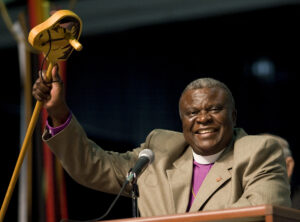Bishop Ntambo Nkulu Ntanda | Democratic Republic of Congo

Bishop Ntambo Nkulu Ntanda, Democratic Republic of Congo
“To buy aspirin one had to walk 50 miles,” explained the Bishop, describing the utility of planting moringa trees, the leaves of which offer natural pain relief. From meeting basic medical needs to negotiating with militia, Bishop Ntambo Ntanda has worked at multiple, interrelated levels to build sustainable peace in Katanga province of the Democratic Republic of Congo (DRC).
Ntambo became a bishop of the United Methodist Church in 1996, at the start of an armed conflict that has killed 5.4 million people to date. He organized care for street children, helping reduce recruitment of child soldiers. He built brick churches and fishponds, and these physical signs of permanence helped empower the people of Kamina to stand firm, not flee, in the face of approaching rebels.
As the war progressed, Bishop Ntambo provided refuge for internally displaced persons (IDPs) and identified clergy and lay leaders among them to organize systems of relief and support both for IDPs and for those who remained in the areas of heavy violence. He solicited food and medical supplies from the United Methodist Committee on Relief and distributed them to other affected communities as well as his own, through his relationships with local Roman Catholic, Pentecostal and Muslim leaders. In 1998, he created an agricultural training center to develop a way to sustainably feed the displaced. Kamisamba Farm continues to train local farmers and adult and child soldiers seeking to reintegrate into society.
Religious, governmental, traditional/tribal, and military leaders have all identified Bishop Ntambo as a spiritual guide; they have sought him out to pray both with them and for them. His relationships with diverse actors make him an effective mediator. In 2004, the government asked Bishop Ntambo to convene a peace conference with the Mai-Mai (or Mayi-Mayi) militia in Katanga, a group labeled evil by the national army.
Bishop Ntambo and his pastors reduced the “otherness” of the Mai-Mai. At a time when even the governor would not meet the Mai-Mai leader, the Bishop invited Chinja Chinja, to dinner in his home, a powerful gesture of welcome. One pastor researching the conflict learned that many militia members were members of various religious communities in the area. Bishop Ntambo made it clear that the Mai-Mai were “children of the community” and first and foremost human beings.
The successful peace conference facilitated the cessation of hostilities, the disarmament of the militia and the integration of some members into the national army. The Bishop called on the government to listen to the grievances of the militia and to restore order within the national army, which the Mai-Mai accused of abusing the local people. In addition to negotiating, Bishop Ntambo organized an interreligious network to promote long-term healing and reconciliation.
In 2005, Ntambo was asked to facilitate reconciliation during a crisis in the United Methodist church in Nigeria. During two years as interim bishop in the country, he led Nigerian church members to elect their own resident bishop. In 2007, Bishop Ntambo was asked to be a senator in the Congolese Parliament as a representative of Katanga province. Still Bishop, he connects the peacebuilding experiences and concerns of his people to national decision-making.
As a senator, Bishop Ntambo works within his position to open doors new development projects while keeping his distance from the corruption expected in politics. In 2013, the Congolese government honored Bishop Ntambo with the highest civilian award for public service, the Order of the Leopard. Still Bishop, he connects the peacebuilding experiences and concerns of his people to national decision-making, always seeking better lives for his people.